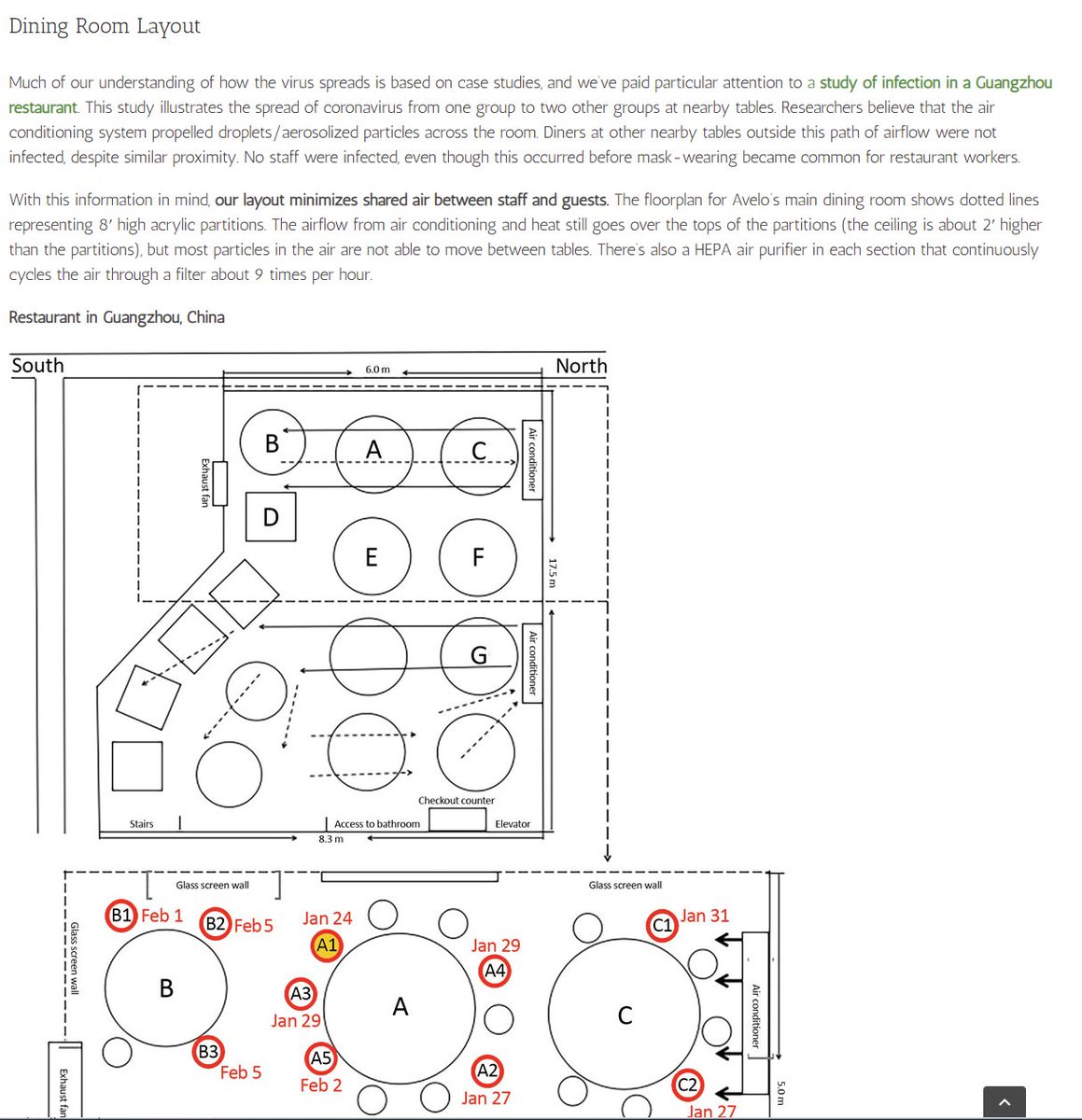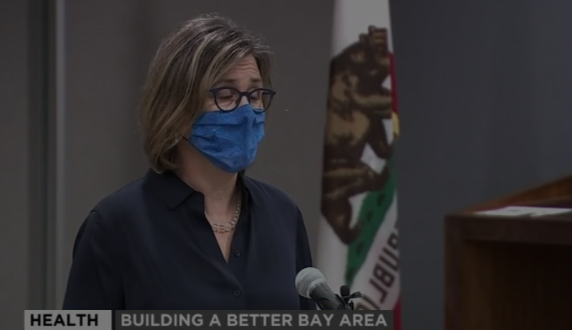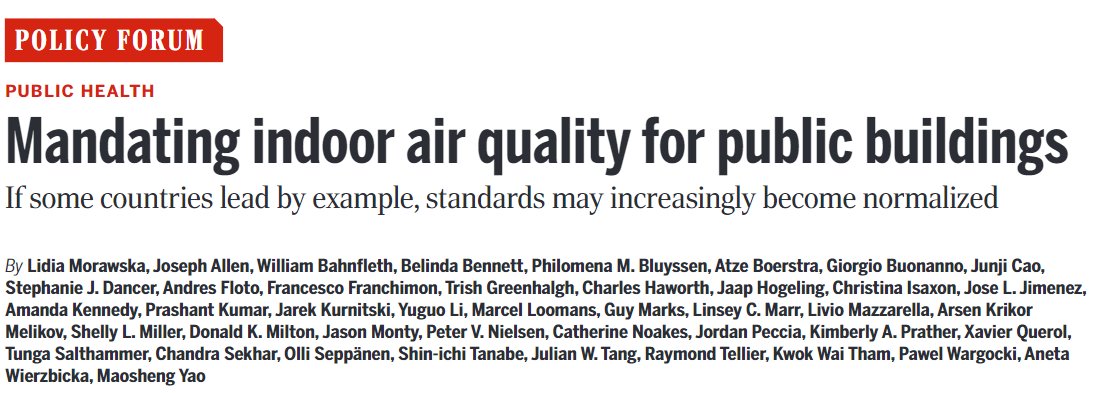1/ Examples of GOOD PRACTICES worldwide to stop transmission, given that #COVIDisAirborne
There are many BAD examples in a separate thread (
Here I will try to compile some of the good examples that others should copy.
There are many BAD examples in a separate thread (
https://twitter.com/jljcolorado/status/1471161759469903873), that others should avoid.
Here I will try to compile some of the good examples that others should copy.
2G/ UK Government: "COVID is like smoke" with a clear visualization:
[Note that many countries have both good and bad examples. Such is the situation we are in, as @WHO et al. don't provide a strong message that would lead to the good mssgs prevailing]
[Note that many countries have both good and bad examples. Such is the situation we are in, as @WHO et al. don't provide a strong message that would lead to the good mssgs prevailing]
https://twitter.com/Orla_Hegarty/status/1459608215956643841
3G/ FRANCE, government: good visualization of the behavior of airborne aerosols indoors, and the impact of ventilation.
https://twitter.com/Orla_Hegarty/status/1458791946084827136
4G/ CANADA, University of Toronto School of Public Health (UofT_dlsph):
The Dean @SteiniBrown says is openly: "IT IS AN AIRBORNE DISEASE, I think that's clear
The Dean @SteiniBrown says is openly: "IT IS AN AIRBORNE DISEASE, I think that's clear
https://twitter.com/smjevnikar/status/1471550717081096195
5G/ NEW ZEALAND: Ministry of Education (@EducationGovtNZ) ordering air purifiers &CO2 monitors to help cut the risk of Covid transmission in schools
Importantly, CO2 readings will be VISIBLE to teachers so they can make adjustments to vent.
nzherald.co.nz/nz/covid-19-de…
HT @venessb
Importantly, CO2 readings will be VISIBLE to teachers so they can make adjustments to vent.
nzherald.co.nz/nz/covid-19-de…
HT @venessb
6G/ CANADA: The Chief Public Health Officer (@CPHO_Canada) confirms that "AEROSOL IS THE MAIN ROUTE OF SPREAD of COVID"
"Think of it like smoke in the room: those closest to the source will inhale more"
Masking and ventilation are "very important"
piquenewsmagazine.com/national-news/…
"Think of it like smoke in the room: those closest to the source will inhale more"
Masking and ventilation are "very important"
piquenewsmagazine.com/national-news/…
7G/ PORTUGAL: National Health Service (@SNS_Portugal) gives a clear message about airborne transmission indoors. Advises ventilation, physical distancing, and masks.
HT @Co2Marta
HT @Co2Marta

8G/ VIETNAM: IPC Guidelines of the Ministry of Health (@VNGovtPortal) recommend "controlled ventilation in examination and patient rooms", "to prevent AIRBORNE infections"
https://twitter.com/DzungLeVN/status/1366666461620498435
9G/ USA: CDC Environmental Health (@CDCEnvironment) has some good materials about improving ventilation, including upgrading HVAC filters, using HEPA filters, and running exhaust fans.
The main @CDCgov doesn't promote these, but at least they are there
The main @CDCgov doesn't promote these, but at least they are there
https://twitter.com/CDCEnvironment/status/1471864279108313092
10G/ FRANCE (Government, @gouvernementFR):
"COVID transmits essentially through aerosols"
"Emitted when breathing, more when talking. Ventilation helps reduce them"
gouvernement.fr/l-aeration-un-…
"COVID transmits essentially through aerosols"
"Emitted when breathing, more when talking. Ventilation helps reduce them"
gouvernement.fr/l-aeration-un-…

11G/ FRANCE (Government, 6 ministries):
Recommend ventilation if CO2 > 800 ppm
Recommend LEAVING THE INDOOR SPACE if CO2 > 1000 ppm

Recommend ventilation if CO2 > 800 ppm
Recommend LEAVING THE INDOOR SPACE if CO2 > 1000 ppm
https://twitter.com/nousaerons/status/1470494339004567554

12G/ CHILE: poster in schools from the Health Ministry (@ministeriosalud), stating "Open doors and windows! Ventilation removes COVID-19"
https://twitter.com/piterburon/status/1472567556586315781
13G/ UK (National Health Service @NHSuk): another great ad showing the airborne nature of transmission very graphically
[Now, having good ads seems to be decoupled of having actually good policies in place. Perhaps ads are cheaper than policies?]
[Now, having good ads seems to be decoupled of having actually good policies in place. Perhaps ads are cheaper than policies?]
https://twitter.com/NHSuk/status/1464311643765153801
14/ SPAIN: @elpaisinenglish newspaper has done several spectacular articles with very clear graphics illustrating and quantifying transmission:
[Which have won awards from @aaas and others; authors @javisalas y @marianozafra]
elpais.com/especiales/cor…
[Which have won awards from @aaas and others; authors @javisalas y @marianozafra]
elpais.com/especiales/cor…
15G/ JAPAN: Public display of CO2 in EACH movie in a movie theater.
Shows (in this case) low risk of transmission of COVID or other resp. diseases.
Can be done everywhere at low cost.
#covidCO2 (see section 9 of Bit.ly/FAQ-A for details)
Shows (in this case) low risk of transmission of COVID or other resp. diseases.
Can be done everywhere at low cost.
#covidCO2 (see section 9 of Bit.ly/FAQ-A for details)
https://twitter.com/NOGjp/status/1418146334612221953
16G/ BELGIUM: COVID Commissioner @PedroFacon:
"You can compare transmission best w/ cigarette smoke", can infect close by, also when sharing room
CO2 meters:
• Rec.: ALL indoor public spaces
• MANDATORY: hotels, restaurants, bars, banquet halls & gyms
"You can compare transmission best w/ cigarette smoke", can infect close by, also when sharing room
CO2 meters:
• Rec.: ALL indoor public spaces
• MANDATORY: hotels, restaurants, bars, banquet halls & gyms
https://twitter.com/mdc_martinus/status/1401278363449409539
17G/ ARGENTINA (Government): Science and Health ministries (@msalnacion, @ciencia_ar) recommend to ventilate when #CO2 exceeds 700ppm.
argentina.gob.ar/sites/default/…
HT @covidco2_map
argentina.gob.ar/sites/default/…
HT @covidco2_map

18G/ JAPAN: AEON Mall Franchise (@aeonmall_japan) monitors and displays indoor #CO2 in 160 locations.
Relatively safe levels in that instance (even more so if there is some filtration of recirculated air)
HT @covidco2_map
Relatively safe levels in that instance (even more so if there is some filtration of recirculated air)
HT @covidco2_map

19G/ JAPAN; Business owners are advertising the fact that they monitor CO2 levels in-store (keeping levels below 1000ppm) to encourage customers to visit their stores.
They upload real-time store CO2 levels on Google Maps!
We need this EVERYWHERE
They upload real-time store CO2 levels on Google Maps!
We need this EVERYWHERE
https://twitter.com/ToshiAkima/status/1470579542934777861
20G/ SPAIN (Seville Metro / Subway @_metrodesevilla):
"from now on, the levels of CO2 concentration, will be openly and continuously available through the website and the app of the subway"
europapress.es/esandalucia/se…

"from now on, the levels of CO2 concentration, will be openly and continuously available through the website and the app of the subway"
europapress.es/esandalucia/se…
https://twitter.com/covidco2_map/status/1457657637965807618

21/ FRANCE Health Ministry (@Sante_Gouv):
Interviewing infectologist:
- About 90% of transmission is through aerosols, often without symptoms
- Ventilation is very important
- Well fit mask important
- Works for the flu and other resp. infections
Interviewing infectologist:
- About 90% of transmission is through aerosols, often without symptoms
- Ventilation is very important
- Well fit mask important
- Works for the flu and other resp. infections
https://twitter.com/Sante_Gouv/status/1472673096905621504
22G/AUSTRALIA: Chief Health Officer of Victoria @VictorianCHO of @VicGovDH w/ clear message:
- COVID-19 is airborne
- Risk indoors much higher than outdoors
- Description of ventilation methods
- Recognizes occupational physicians & ventilation experts
- COVID-19 is airborne
- Risk indoors much higher than outdoors
- Description of ventilation methods
- Recognizes occupational physicians & ventilation experts
https://twitter.com/VicGovDH/status/1473127266934611971
23G/ @WHO: Chief Scientist @doctorsoumya finally today (22-Dec-2021) referred to SARS-CoV-2 as "THIS AIRBORNE VIRUS".
Also now respirators (N95/FFP2/Elastomeric) are finally recommended in health care

Also now respirators (N95/FFP2/Elastomeric) are finally recommended in health care
https://twitter.com/doctorsoumya/status/1473522579096752128
https://twitter.com/WHO/status/1473668676549283844

24G/ CANADA (National Government and Chief Public Health Officer): a very clear video about the importance of ventilation and air cleaners:
[It is the provinces that are hopelessly lost, esp. @CDCofBC, @ArrudaHoracio; @adriandix; @AntibioticDoc etc.]
[It is the provinces that are hopelessly lost, esp. @CDCofBC, @ArrudaHoracio; @adriandix; @AntibioticDoc etc.]
https://twitter.com/CPHO_Canada/status/1474077451886149634
25G/ IRELAND: FFP masks (= N95 or better) to be worn by health care workers in ALL healthcare settings. Also for patients who can wear them.
Follows recommendation from @WHO (
Follows recommendation from @WHO (
https://twitter.com/jljcolorado/status/1473708977020096519)
https://twitter.com/HSELive/status/1474381849585766405
@WHO 26G/ USA (Arizona, @ASU_CGH): volunteering to build #CorsiRosenthalBox to distribute to schools, & remove the virus from the air
Just as effective as HEPA filters, a lot cheaper. More info at cleanaircrew.org/box-fan-filter…
#COVIDBestPractices
@CleanAirCrewOrg
Just as effective as HEPA filters, a lot cheaper. More info at cleanaircrew.org/box-fan-filter…
#COVIDBestPractices
@CleanAirCrewOrg
https://twitter.com/JehnML/status/1477785506599505925
27G/ SPAIN 🇪🇸 (@BilbaoAirport): signs stating that ventilation on the terminal has been improved
Unlike e.g. this airport in Florida, USA 🇺🇸(
#COVIDBestPractices
Unlike e.g. this airport in Florida, USA 🇺🇸(
https://twitter.com/jljcolorado/status/1475879944819462145) which is in the #COVIDHallofShame
#COVIDBestPractices
https://twitter.com/libresdecovid/status/1477983605079085062
28G/ CANADA 🇨🇦 (Toronto, restaurant): serious plan to reduce transmission in indoor dining: reduced capacity, staff vaccinated, serious ventilation, filtering, masks
They have an analysis of the Guangzhou restaurant superspreading event & how to avoid it

They have an analysis of the Guangzhou restaurant superspreading event & how to avoid it
https://twitter.com/apmalong/status/1473087369075064838

29G/ USA 🇺🇸: Some Universities (e.g. @LSUHealthNO @UMBaltimore) require KN95 or N95 masks
“With Omicron it appears that the contagion plus the aerosol aspect is very similar to measles and therefore requires this higher-level mask”
chronicle.com/blogs/live-cor… by @Oyin_Adedoyin_
“With Omicron it appears that the contagion plus the aerosol aspect is very similar to measles and therefore requires this higher-level mask”
chronicle.com/blogs/live-cor… by @Oyin_Adedoyin_

30G/ CANADA 🇨🇦 (@OslerHealth Hospital in Toronto):
The first hospital Canada to require all visitors to wear respirators (in addition to staff). This is how to fight an airborne virus
#COVIDBestPractices
The first hospital Canada to require all visitors to wear respirators (in addition to staff). This is how to fight an airborne virus
#COVIDBestPractices
https://twitter.com/KashPrime/status/1478254437344940035
31G/ JAPAN 🇯🇵 (Hidaka City): Free distribution of CO2 monitors to 900 offices. To monitor & reduce risk of (dominant) airborne transmission of COVID-19
@ToshiAkima: "This is why Japan's COVID case rates are under control"
#COVIDBestPractices
#COVIDCO2
@ToshiAkima: "This is why Japan's COVID case rates are under control"
#COVIDBestPractices
#COVIDCO2
https://twitter.com/ToshiAkima/status/1470570541530578945
32G/ GERMANY 🇩🇪 (Bavarian Schools):
- Mask mandate indoors
- PCR Pool-Test 2x per week + extra rapid test if delayed PCR
- Air cleaners subsidized for all classrooms (currently only 50% bf Christmas)
- or ventilating every 20 minutes
#COVIDBestPractices
- Mask mandate indoors
- PCR Pool-Test 2x per week + extra rapid test if delayed PCR
- Air cleaners subsidized for all classrooms (currently only 50% bf Christmas)
- or ventilating every 20 minutes
#COVIDBestPractices
https://twitter.com/eliaaaahh/status/1478500884791320577
33G/ SPAIN 🇪🇸 (Asturias @GobAsturias): Regional Government mandates CO2 meters in bars, restaurants, and gyms
Increase ventilation and reduce occupancy if CO2 > 800 ppm
Government will inspect to verify compliance.
#COVIDBestPractices
#COVIDCO2
lne.es/asturias/2021/…
Increase ventilation and reduce occupancy if CO2 > 800 ppm
Government will inspect to verify compliance.
#COVIDBestPractices
#COVIDCO2
lne.es/asturias/2021/…
34G/ GERMANY 🇩🇪 (Hamburg schools):
- Mask mandate. Schools can get FFP2 from authorities
- 90% of all class rooms with air cleaners AND ventilating every 20 minutes
- Test 3x / wk
- mass vaccinations - opportunities in every school
#COVIDBestPractices
- Mask mandate. Schools can get FFP2 from authorities
- 90% of all class rooms with air cleaners AND ventilating every 20 minutes
- Test 3x / wk
- mass vaccinations - opportunities in every school
#COVIDBestPractices
https://twitter.com/KonProg/status/1478529305126842370
35G/@WHO🇺🇳: finally admitted clearly on webpage: transmission in close proximity is SHORT-RANGE AIRBORNE (not just "droplet") & long-range airborne is important
[But if webpage is updated quietly in the forest & nobody hears about it, does it help?]
who.int/news-room/ques…
[But if webpage is updated quietly in the forest & nobody hears about it, does it help?]
who.int/news-room/ques…

36G/ USA🇺🇸(Santa Clara County, CA @HealthySCC): the Public Health team does not remove their masks when speaking indoors.
@WHO: when are you going to emulate them?


@WHO: when are you going to emulate them?
https://twitter.com/CohenZakai/status/1478739549912440842


37/ FRANCE🇫🇷: MP @M_Orphelin brought a CO2 monitor to Parliament today:
- Pointed out CO2 > 800 ppm in parliament, until some MPs left after a vote
- Recommended that the government massively installs them in each classroom
#covidCO2
#COVIDBestPractices
- Pointed out CO2 > 800 ppm in parliament, until some MPs left after a vote
- Recommended that the government massively installs them in each classroom
#covidCO2
#COVIDBestPractices
https://twitter.com/M_Orphelin/status/1478066966476820483
38/ SINGAPORE🇸🇬: Ventilation improv. ongoing for more than a year
- >= MERV14 filters
- CO2 monitoring
- Good guidelines on air cleaners: recommends filters, UV
- Does NOT recommend chemical sprays and electronic ones (ions etc.)
nea.gov.sg/our-services/p…
- >= MERV14 filters
- CO2 monitoring
- Good guidelines on air cleaners: recommends filters, UV
- Does NOT recommend chemical sprays and electronic ones (ions etc.)
nea.gov.sg/our-services/p…
https://twitter.com/kalisvar/status/1472837804056928256
• • •
Missing some Tweet in this thread? You can try to
force a refresh










